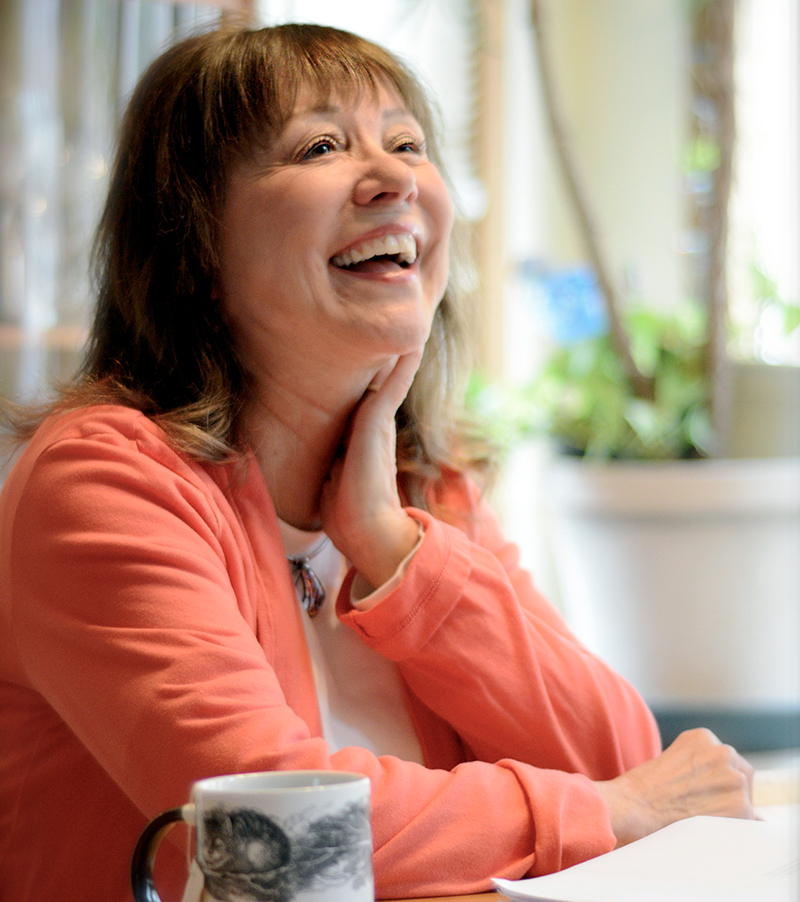
Presented by Equity Bank
As Maryfrances Wagner read her original place-centered poem at the Missouri Capitol this past summer, she officially began her tenure as Missouri Poet Laureate for 2021-2023, appointed by Governor Mike Parson. In verse, she celebrated the place where she and her husband, Greg Field, love to walk their dogs:
Little Blue Trace, still as glass all winter, breaks its silence to eel around its curves.
(Read the entire poem here)
The Independence, Missouri, native has taught creative writing at all levels and has served on the boards of the American Poet Series and Kansas City Creates, which produces the Fringe Festival. Currently, she is the programming chair of The Writers Place, which hosts monthly virtual readings by writers in the Kansas City area and beyond. One of her missions as poet laureate is “to reach out to people who don’t usually read poetry or even think they like it,” she says. “Not every poem has to blow the top of my head off,” she says, echoing the eminent poet Emily Dickinson, who once wrote, “If I feel physically as if the top of my head were taken off, I know that is poetry.” Yet Wagner does want people to relate to a poem in some way—even if she has to stuff a tiny book of poetry in their grocery bag.
What is a poet laureate and what are your duties?
Essentially, the Missouri Poet Laureate promotes poetry throughout the state. Because of Covid, it’s been impossible to do much traveling, so I’ve been working on other projects statewide. One is the creation of tiny books by ten Missouri poets who hand them out to people who don’t usually read poetry. Sometimes I drop them in a grocery bag or give them to people while I’m out walking. I’ve also done ten podcasts with ten more Missouri poets. The Missouri Arts Council has been uploading them to Anchor, Spotify, Apple, the DESE state site, as well as other podcast options. The hope is that teachers will share them with students, and people will listen to them in their car, while making dinner, or when they want to sit down to write. Each podcast asks the poet to answer two questions about the craft, give a writing prompt, and read two poems.
How did your Italian family encourage writing poetry?
My mother used to write little poems. Usually they were about nature, and she would tuck them into our lunch bags, camping gear, duffel bag, or suitcase. Sometimes she put them on our pillows or at our dinner plates. My dad also included a poem he wrote for my mother in each card he gave her. When I was in junior high, a teacher asked us to write about country living, and my parents suggested I try a poem. The teacher put it in the school literary magazine, and, thus, my career direction began. Many of my poems have come from my family’s Italian background. I have a chapbook of Aunt Mary poems, monologues of her talking. Every one of my books has a section of family poems, and the latest book, The Immigrants’ New Camera, is a collection of family poems. My family, especially my storytelling aunts, always gave me good material. I think any writer writes from what he or she knows, has lived, or has observed, and traditions show up in our writing.
Why is making poetry more accessible so important to you?
Any time I have taught poetry in a literature and non-writing class, students at all levels have balked when we came to the poetry unit. Many of them said they didn’t like poetry and didn’t “get it.” I always said, “Give me a chance to change your mind,” and exposed them to poems I thought would connect with them. Like most poets, I’ve wanted to touch the human spirit and move the reader. That’s what I want to happen to me as well when I read a poem. Not every poem is easily accessible, and not every poem will have the same impact on a person, but poems abound out there for all of us. I want to help find those poems for people.
How has the Kansas City metro area nurtured your creative spirit?
I think I am the only Missouri Poet Laureate who has lived an entire life in Missouri, so naturally, I know and feel its rhythms, its seasons. I have favorite places: the Plaza and Brookside for great shops and restaurants, downtown where we window shopped and ate in tea rooms, Union Station, Crown Center, Starlight, Swope Park, and the City Market, where I still go for spices and herbs and Italian specialties. Also, I have a great love for nature, and my husband, Greg Field, and I walk our dogs every day along Little Blue Trace trail. Much of what I see ends up in my poems.


